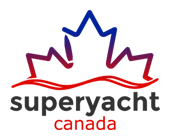Arriving in Canada onboard a yacht involves several important considerations, including customs procedures, safety regulations, and taxation. We have provided some resources below to ensure that the arrival experience goes as smoothly as possible.
Canadian Border Services
If you’re entering Canadian waters and plan to dock, anchor, moor, or interact with another vessel, you must report to the Canada Border Services Agency (CBSA). If you’re just passing through without stopping, you may be exempt from this requirement. Full details on exemptions can be found on the CBSA’s Reporting Exceptions page. To avoid any issues (e.g., Failure to Report charges1), we recommend reporting to CBSA regardless of your plans.
Reporting
Unless directed otherwise by an officer, you’ll need to report to the CBSA by phone at the nearest open Designated Marine Telephone Reporting Site. In Eastern/Atlantic Canada, there are also a few staffed marine ports of entry where you can report in person instead of calling.
The operator of the boat is the only one permitted to complete the report. They will be required to provide (1) the reasons for the trip, (2) passenger information, and (3) any goods to declare.
Note to NEXUS cardholders: To use NEXUS, everyone onboard the vessel must also be a member, regardless of their age. The operator is responsible for making sure everyone on the vessel is a NEXUS member and is carrying their NEXUS card. More detail available on the CBSA website.
Passenger Information
For each person on-board the vessel that is a Canadian citizen, permanent resident and/or person registered under the Indian Act you must present the following information:
- full name, date of birth and citizenship
- the length of absence from Canada
- acceptable identification
For each foreign national on-board the vessel you must present the following information:
- full name, date of birth and citizenship
- the length of absence from Canada
- acceptable identification
- desitination
- visa information, if applicable
Goods To Declare
All passengers must declare:
- any goods being brought into Canada, including restricted and prohibited goods2. Any undeclared restricted and prohibited goods found on board will be seized and you could face criminal charges.
- currency or monetary instruments totaling CAN$10,000 or more.
NOTE: Any Canadian resident, former resident returning to live in Canada, or temporary resident of Canada returning from a trip outside Canada is eligible for personal exemptions.
NOTE: Residents of Canada must also provide details about any repairs or modifications made to goods, including the boat, while these items were outside Canada.
If you do not need further verification or examination, the officer will provide you with a report number.
Secondary Inspection
If a secondary inspection is necessary, the officer will advise you to remain at the inspection site, or to go to one if you are reporting from the water, and to ensure that all goods and passengers remain onboard.
When an inspection is required, the border services officer who conducts the secondary inspection will provide you with the report number.
CBSA Contact Information
Telephone Reporting Centre telephone reporting line:
Toll free: 1-888-226-7277
NEXUS telephone reporting line:
Toll free: 1-866-99-NEXUS (1-866-996-3987)
Border Information Services:
Toll free: 1-800-461-9999
- The CBSA and its law enforcement partners are actively monitoring Canadian waterways. Failure to report to the CBSA may result in detention, seizure or forfeiture of your boat and/or monetary penalties. If you fail to report, even if your purpose is non-discretionary (non-optional) such as to refuel, you may face severe penalties. The minimum fine for failing to report to the CBSA upon entry to Canada is CAN$1,000. Failure to report may also affect your immigration admissibility and ability to re-enter Canada in the future. Foreign nationals who provide false information could also be denied entry and be banned from returning to Canada. ↩︎
- Restricted and prohibited goods include (but are not limited to): firearms and weapons, food and animal products, explosives, fireworks, ammunition, and cannabis in any form without a permit (including THC- or CBD-free oils). See the link for the full, up-to-date list. ↩︎
